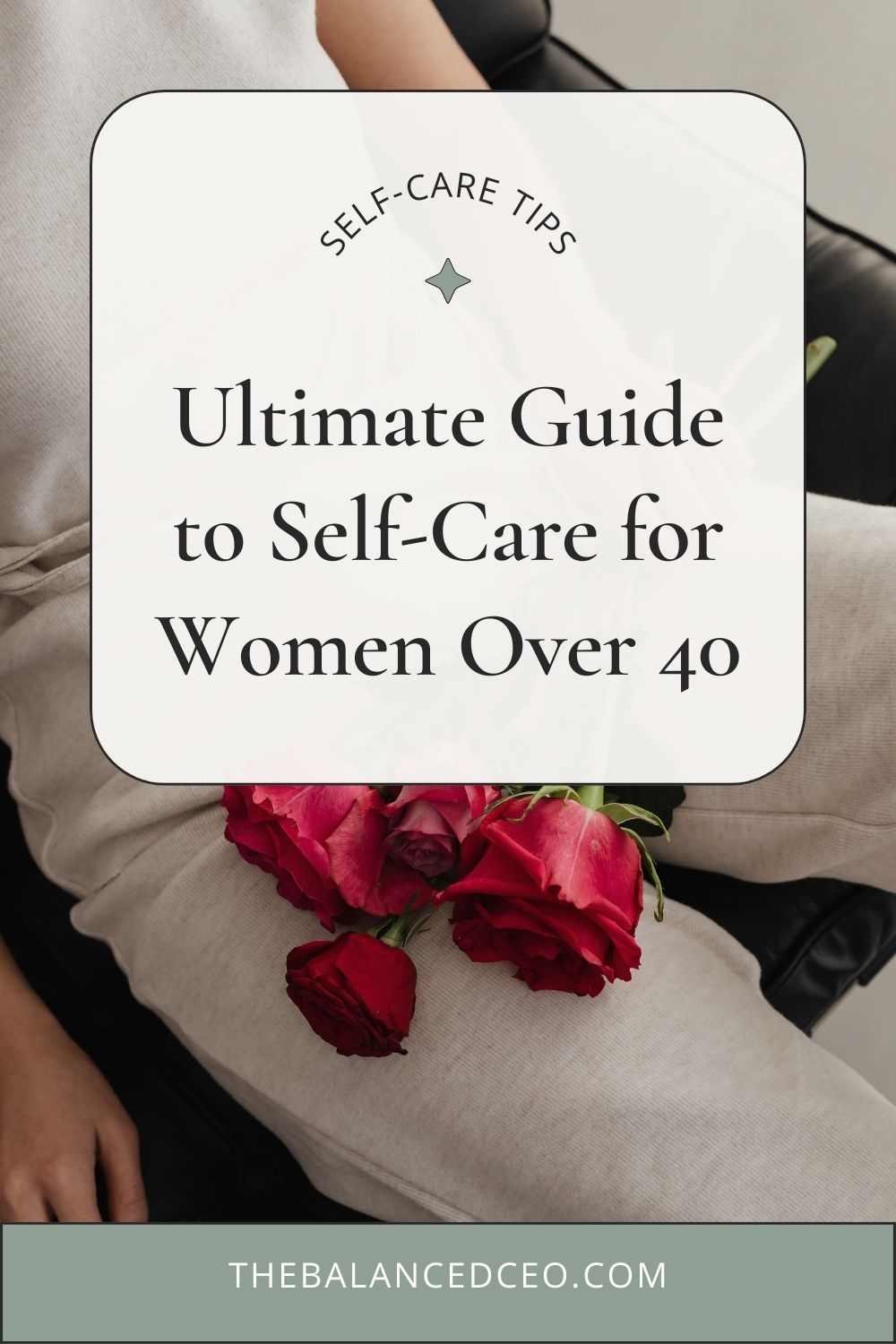This post may contain affiliate links, which means I’ll receive a commission if you purchase through my links, at no extra cost to you. Please read full disclosure for more information.

Self-care isn’t a luxury for women over 40; it’s essential. Nurturing your body, mind, and spirit is crucial because midlife women encounter health challenges. This guide offers practical strategies and expert advice to thrive in midlife and beyond.
Physical Health
Nutrition
For women aged 40 and up, maintaining a balanced diet is vital. As metabolism slows with age, the body needs fewer calories but demands more nutrients to stay healthy. A nutritious diet boosts energy levels, strengthens the immune system, and helps prevent chronic diseases.
Here are specific dietary tips for women in this age group.
1. More Fruits and Vegetables
Aim to fill half your plate with colorful fruits and vegetables. They are rich in essential vitamins, minerals, and antioxidants that help combat aging and keep you feeling energized.
2. Prioritize Protein
Protein is vital for maintaining muscle mass, which tends to decline with age. Add lean protein sources such as chicken, fish, beans, and legumes to your meals.
3. Choose Whole Grains
Replace refined grains with whole grains such as brown rice, quinoa, and whole wheat bread. Whole grains are high in fibre, which aids digestion and keeps you feeling full longer.
4. Healthy Fats are Essential
Incorporate in your diet seeds, nuts, and avocados. Also, use olive oil. These fats promote heart health and help preserve skin elasticity.
5. Stay Hydrated
Consuming plenty of water is essential for overall health. It helps with digestion, nutrient absorption, and keeping your skin hydrated. Try to drink at least 8 glasses a day.
6. Limit Processed Foods and Sugars
Junk food, canned goods, sweets, and many other sugary treats can result in weight gain and other health issues. Try to limit these and replace them with whole, natural foods.
Exercise
Regular exercise is vital for women over 40. It helps manage weight, enhances heart health, lifts mood, and boosts energy levels. Exercise also supports bone strength, reducing the risk of osteoporosis. Additionally, it helps maintain muscle mass, which tends to decrease with age.
1. Cardio Workouts
Activities like brisk walking, swimming, and cycling are great for heart health and increasing endurance.
2. Strength Training
Use weights or resistance bands to build and maintain muscle. Focus on major muscle groups at least twice a week.
3. Flexibility and Balance
Yoga and Pilates improve flexibility, balance, and core strength while also helping reduce stress.
4. HIIT Workouts
High-Intensity Interval Training involves short bursts of intense exercise followed by rest. It’s effective for improving heart health and burning fat.
Sleep
Quality sleep is essential for women in midlife. It helps with body repair, mental sharpness, and mood regulation. Good sleep also strengthens the immune system and keeps metabolism in check. Poor sleep can lead to stress, weight gain, and health issues. Below are tips to achieve better sleep.
1. Stick to a Routine
Go to bed and wake up at the same time daily to set a regular sleep pattern.
2. Relax Before Bed
Unwind with calming activities like reading or a warm bath, and avoid screens and stimulating activities.
3. Create a restful sleep environment
Ensure your bedroom is cool, dark, and quiet. Choose a comfortable mattress and pillows, and use blackout curtains or white noise if needed.
4. Limit Caffeine and Alcohol
Avoid these substances in the hours leading up to bedtime, as they can disrupt your sleep.
Mental Well-Being
Stress Management
Women in their forties frequently balance career demands, family obligations, and personal health changes. Stressors may include caring for children, aging parents, dealing with hormonal shifts, and balancing relationships and social commitments.
So, here are stress management techniques you can apply:
1. Regular Exercise
Walking, swimming, or jogging can help relieve stress and improve mood.
2. Leisure
Make time for relaxing activities you enjoy, like reading or taking a bath, to prevent burnout.
3. Effective Time Management
Use tools like calendars and to-do lists to organize tasks and manage your time better. Prioritise and delegate when possible.
4. Social Support
Reach out to friends, family, or a therapist for emotional assistance.
5. Set Boundaries
Learn to say no and set limits to avoid overcommitting and maintain a healthy work-life balance.
Mindfulness and Meditation
Mindfulness and meditation effectively reduce stress, improve focus, and boost emotional well-being. They help you stay calm, enhance mental clarity, and manage anxiety.
1. Mindful Breathing
Take a few minutes to focus on your breath—inhale deeply through your nose, hold briefly, and then exhale slowly. This helps centre your mind.
2. Guided Meditation
Use an app or online guide to follow meditation sessions, making it easier to practise regularly.
3. Gratitude Journaling
Record a few things you’re thankful for each day. This redirects your attention to the positive aspects of life.
These simple practices can help reduce stress, enhance focus, and improve your overall well-being.
Emotional Health
Emotional well-being is vital for self-care. It helps you stay resilient and maintain positive relationships, leading to a more satisfying life. Below are tips for a positive outlook and emotional balance.
1. Be Kind to Yourself
Treat yourself with compassion and acknowledge your strengths.
2. Set Attainable Goals
Divide large tasks into smaller steps to maintain motivation.
3. Use Positive Self-Talk
Replace negative thoughts with affirmations about your abilities.
4. Connect with Others
Maintain strong relationships for support and perspective.
5. Enjoy Hobbies
Spend time on activities you love to boost your mood and relaxation.
6. Seek Support
If needed, talk to a therapist for guidance on managing emotions.
Medical Solutions and Routine Screenings
Intimate Health
Intimate health is a crucial aspect of overall well-being that impacts both physical comfort and emotional confidence. It encompasses the health of your reproductive and sexual organs, influencing everything from comfort during daily activities to the quality of intimate relationships.
As women age, hormonal changes and factors like childbirth can impact intimate health. By prioritizing your intimate health, you not only enhance your physical comfort but also bolster your emotional well-being. Proper care and attention in this area can prevent issues from interfering with your daily life and strengthen your relationships, leading to a higher quality of life overall.
1. Schedule Regular Check-Ups
Regular check-ups with your healthcare provider are crucial for monitoring intimate health. These visits allow your doctor to detect and address issues early. Schedule routine gynecological exams, including pelvic exams and Pap smears, as recommended for your age.
2. Maintain Good Personal Hygiene
Proper hygiene is important, but it should be done gently. Use mild, fragrance-free soaps and avoid douching, which can disrupt the natural balance of bacteria and yeast in the intimate area. Choose cotton underwear and breathable fabrics to minimize moisture and irritation. These practices support a healthy intimate environment.
3. Educate Yourself
Understanding the changes that occur with age and their effects on intimate health is important. Learn about common issues such as hormonal changes and menopause. Being informed helps you recognize symptoms early and seek timely medical advice.
4. Explore Treatment Options
- Non-Surgical Options: For many women, non-invasive treatments can address intimate health concerns such as vaginal laxity and stress incontinence. ThermiVa, for instance, is a non-invasive treatment that uses radiofrequency technology to gently tighten and rejuvenate vaginal tissues without the need for surgery. This procedure improves vaginal laxity, enhances sexual satisfaction, and offers relief from mild urinary incontinence.
Other non-surgical options for improving intimate health include Pelvic floor exercises, like Kegels, Laser therapy, and the use of topical treatments, such as oestrogen creams or lubricants to alleviate dryness and discomfort associated with hormonal changes.
- Surgical Options: In some cases, surgical procedures might be recommended to address specific issues. These may include labiaplasty and vaginoplasty with or without a perineoplasty and other corrective surgeries, which should be discussed with your healthcare provider to determine if they are appropriate for your needs.
Breast Health
Perform Regular Self-Examinations
Regular self-examinations are crucial for breast health in your forties. By checking your breasts daily, you become accustomed to their normal appearance and texture, making it easier to detect any unusual changes like lumps, swelling, or skin alterations early on.
Schedule Regular Mammograms
Mammograms are crucial for the early detection of breast cancer, which is more prevalent in women over forty. Mammograms can detect tumours that are too small to be felt during self-examinations. Early detection significantly improves treatment success rates and outcomes. Women at higher risk of breast cancer might also benefit from undergoing breast MRI.
Bone Health
As women get older, bone density can decline, which raises the risk of osteoporosis. To support bone health, make sure to get enough calcium and vitamin D from your diet or supplements. In addition, weight-bearing exercises like strength training, walking and jogging can help maintain bone density.
Cardiovascular Health
Heart health becomes increasingly important in your forties. Regular check-ups to monitor blood pressure, cholesterol levels, and blood sugar are crucial. Include cardiovascular exercises such as brisk walking, cycling, or swimming in your routine to boost heart health. Reducing intake of saturated fats, trans fats, and added sugars can also help manage cholesterol and maintain a healthy weight.
Conclusion
Self-care for women over 40 is crucial for maintaining overall well-being. Focusing on nutrition, regular exercise, and quality sleep supports physical health, while stress management and mindfulness enhance mental resilience. Routine medical check-ups and screenings ensure early detection and prevention of health issues. Consult with licensed medical professionals to learn which treatment is appropriate for you.
By embracing these self-care strategies, women can navigate their forties with confidence and vitality, making it a decade of health and fulfillment.
Ferdinand Obi (MBBS, MWACS, FMCOG, MPH)
Guest Blogger





Leave a Reply